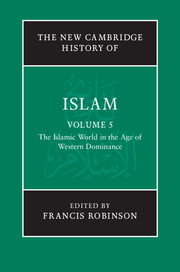Book contents
- Frontmatter
- Introduction
- PART I THE ONSET OF WESTERN DOMINATION C. 1800 TO C. 1919
- 1 The Ottoman lands to the post-First World War settlement
- 2 Egypt to c. 1919
- 3 Sudan, Somalia and the Maghreb to the end of the First World War
- 4 Arabia to the end of the First World War
- 5 Iran to 1919
- 6 Russia, Central Asia and the Caucasus to 1917
- 7 Afghanistan to 1919
- 8 South Asia to 1919
- 9 South-East Asia and China to 1910
- 10 Africa south of the Sahara to the First World War
- PART II INDEPENDENCE AND REVIVAL C. 1919 TO THE PRESENT
- Glossary
- Bibliography
- Index
- References
8 - South Asia to 1919
from PART I - THE ONSET OF WESTERN DOMINATION C. 1800 TO C. 1919
Published online by Cambridge University Press: 28 March 2011
- Frontmatter
- Introduction
- PART I THE ONSET OF WESTERN DOMINATION C. 1800 TO C. 1919
- 1 The Ottoman lands to the post-First World War settlement
- 2 Egypt to c. 1919
- 3 Sudan, Somalia and the Maghreb to the end of the First World War
- 4 Arabia to the end of the First World War
- 5 Iran to 1919
- 6 Russia, Central Asia and the Caucasus to 1917
- 7 Afghanistan to 1919
- 8 South Asia to 1919
- 9 South-East Asia and China to 1910
- 10 Africa south of the Sahara to the First World War
- PART II INDEPENDENCE AND REVIVAL C. 1919 TO THE PRESENT
- Glossary
- Bibliography
- Index
- References
Summary
The period 1800–1920 saw the roughly one-quarter of the world’s Muslims who lived in the Indian subcontinent enter the modern world. They moved from a time when the Mughal emperor, in theory at least, still guaranteed the existence of the Muslim community to one in which increasing numbers of Muslims were coming to regard it as their personal responsibility to sustain the Muslim community on earth. This period marked the final assertion of British power in the region and the increasing engagement of Muslims with the possibilities of Western ideas, forms of organisation and technology. Muslims offered a great variety of responses to the new situation, most of which have had ramifications that reach down to the present. The development of mass communications made possible an increasingly intense discourse amongst Muslims within regions, across India and increasingly across the world. Communities of Muslims emerged which could in their interactions with the colonial state be presented as one Muslim community. There developed alongside this the idea among some Muslims that they had separate interests from those of other Indians, and the formation of organisations to support these interests.
The imposition of British rule and the movements of Islamic reform, 1800–57
In 1803 the British defeated the Marathas outside Delhi and made the Mughal emperor a British pensioner. Soon afterwards Shāh ʿAbd al-ʿAzīz, head of Delhi’s Walī Allāhī family of ʿulamāʾ, issued a fatwā declaring India dār al-ḥarb.
- Type
- Chapter
- Information
- The New Cambridge History of Islam , pp. 212 - 239Publisher: Cambridge University PressPrint publication year: 2010

